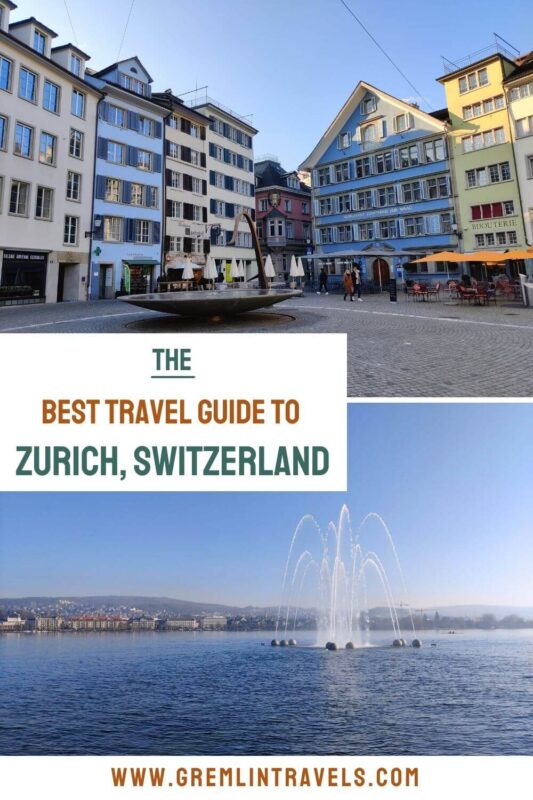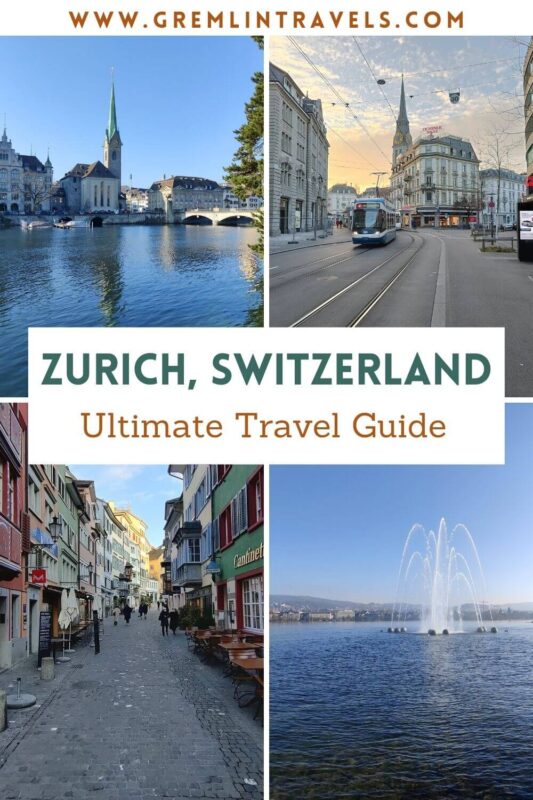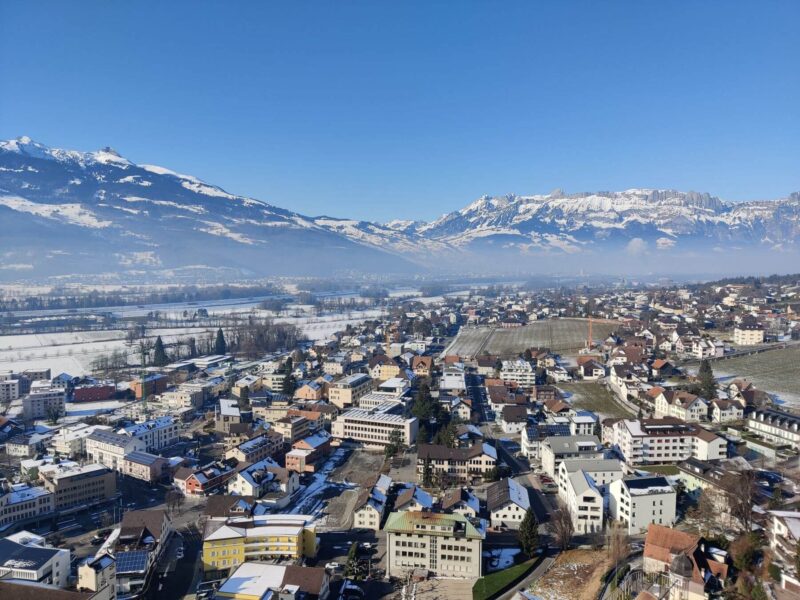Zurich
Travel Guide
Welcome to our Zurich travel guide, where we explore the largest city in beautiful Switzerland. Known as a financial hub, there’s much more to Zurich than just wealth. Perched at the end of Lake Zurich, the city is an attractive metropolis that combines history, excellent facilities, contemporary design and a vibrant arts culture.
As Switzerland’s biggest city, Zurich is surprisingly compact and incredibly well connected with fantastic public transport. Yet, the different areas of the city, the lake, the upcoming industrial and arts area, the historical quarter and the thriving modern city centre combine to create a city that fulfils every role and offers something for everyone. It’s clear to see why Zurich is often regarded as one of the world’s most liveable cities. What’s more, is Zurich’s close proximity to some of the best Swiss rural landscapes, making it a perfect escape for those looking to combine all the comforts of the city with exploring the Swiss countryside.
Zurich Travel Guide Contents
Check out our other Switzerland Travel Guides:
Lucerne Travel Guide | Basel Travel Guide | Bern Travel Guide | Geneva Travel Guide
Zurich Travel Guide
How to get to Zurich
As a well-connected city, the two most common ways to arrive in Zurich are by plane or train. Zurich Airport (ZRH) is the largest international airport in Switzerland and a common connection and transit hub for European flights. The airport is large, clean and modern with good facilities. It is located 13 kilometres north of Zurich city centre and well connected to the city centre. Zurich HB is the main train station in Zurich, serving trains that run across Switzerland and Europe. It is located in Zurich city centre so getting anywhere in the city centre from the city centre is simple. The station is the largest train station in Switzerland and has a good selection of shops, restaurants. Here are the best options for how to get to Zurich from Zurich airport:
Train – Trains from Zurich airport leave the airport train station, located opposite the arrivals building. Trains to Zurich HB depart every 5-10 minutes from 05:00 until 00:00. Single tickets cost CHF 6.80 ($7.50) per person or CHF 13.60 ($15) for a 24-hour travel pass. The journey from the airport to Zurich takes 10-15 minutes by train
Tram – Line no.10 departs from the airport to Zurich city centre every 8-15 minutes and takes 35 minutes to reach the city centre. The price is the same as the train prices above or free if you have purchased a Zurich card
Taxi – Available from outside arrivals, a taxi from Zurich airport to the city centre will cost around CHF 50-70 ($54-$76) and will take 10-20 minutes depending on your destination. Uber operates across Switzerland. Uber prices are usually cheaper than standard taxis, costing around CHF 35-60 ($38-$65) for a journey from Zurich airport to the city centre
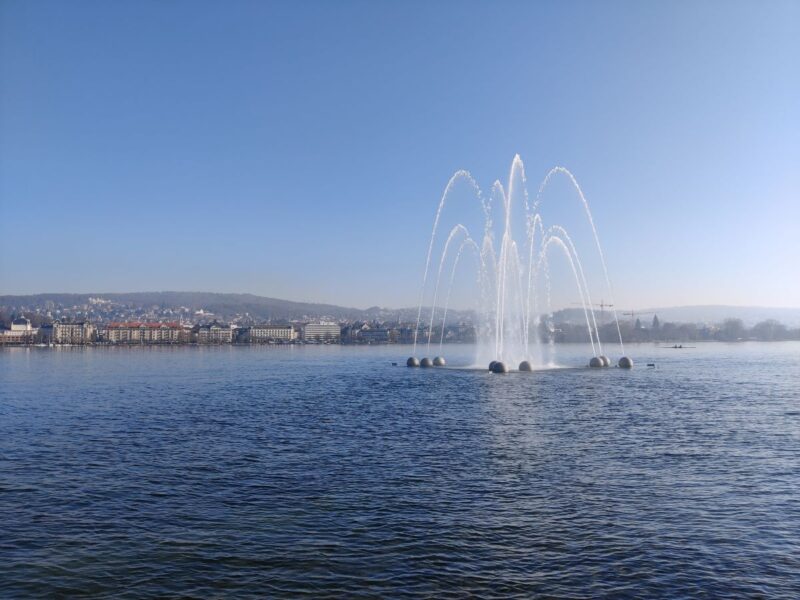
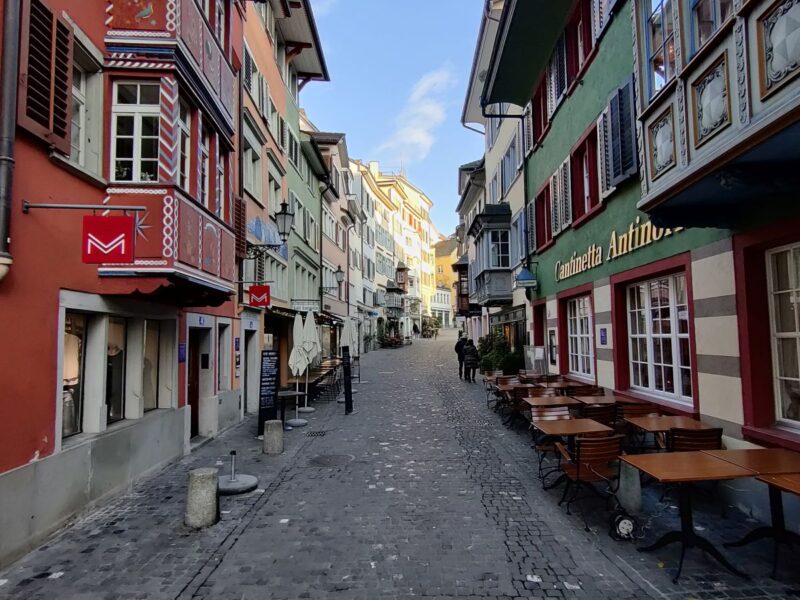
Areas to stay in Zurich
Zurich is fairly compact for a major city, but the city is divided into districts, and although the city is incredibly well-connected by public transport, making sure you stay in the correct area for your needs is important. This will save you both time and money and ensure the best experience possible in Zurich. Here’s a summary of the best areas of the city so you can decide where to stay in Zurich:
City Centre, Zurich city centre is district 1 and encompasses the historical quarter, modern city centre and Zurich HB. This is the most convenient area to stay in the city as it is well connected, has the largest selection of accommodation options, has many shops, restaurants and bars and is where the majority of the major Zurich attractions are. We recommend first-timers to the city stay here, as well as anyone wanting to be close to everything
Langstrasse – Located in district 4 of Zurich, Langstrasse is the nightlife and entertainment quarter of the city. Formerly the red-light district, the area is now home to some of the tops bars and restaurants in the city. It is a multicultural area where you’ll also find the widest range of food options and some of the best restaurants for those on a budget. With plenty of amenities and being close to the train station, Langstrasse is a solid option for anyone who thrives on nightlife or is looking for a wider range of budget accommodation options
Zurich West – Formerly the industrial quarter, Zurich West has become one of the coolest neighbourhoods in the city. There is a mix of old industrial buildings alongside modern, new developments and lots of great things to do here including a great market and lots of arts-related activities. This is a great option for those wanting to be in the cooler part of the city, but it’s a little further out from the city centre and old quarter so be prepared for a long walk or getting public transport into the city
Enge – Located on the west side of Lake Zurich, Enge is a great place to stay for families and those with children. This is one of the greenest areas of the city and has quick access to some of the best parks and walking routes along Lake Zurich. It’s also only a short and scenic walk into the city centre so a great option
Reisbach – Located on the east side of Lake Zurich, Reisbach is also a green area of the city, similar to Enge, and is home to some of the most luxurious hotels in the city. The area is largely residential but it does have great views over the lake, some great restaurants and is only a short walk or short tram ride into the Old Town
Accommodation in Zurich
Zurich has an accommodation option to suit everyone, from luxurious hotels to hostels and apartments. The best range of accommodation options are in the city centre area, however, there is still lots to choose from in other areas of the city. Apartments are more common out of the city centre in areas like Langstrasse. One thing to note is that Switzerland is expensive, and Zurich is certainly no exception to that. Expect to pay more in Switzerland than many other European countries. To avoid paying more, always try to book your accommodation as far in advance as possible. Here are our top picks of where to stay in Zurich:
Budget Hostel | Old Town Hostel Otter – Located in Zurich Old Town, the Old Town Hostel Otter is a great option for budget travellers looking for a simple, clean and well-equipped place to stay. Rooms range from dorms to private doubles and a shared lounge and kitchen area offers guests all the amenities they need for a comfortable stay
Mid-range Hotel | Motel One Zurich – Motel One is a solid, reasonably priced hotel option for visitors to Zurich. The hotel has a modern and comfortable shared lounge and bar area, nice rooms that are well-equipped and it’s a short walk to Zurich city centre and the main sights of the city
Mid-range Hotel | CitizenM Zurich – Located in Zurich city centre, CitizenM is an ideal base for those wanting to explore Zurich and have a contemporary, well-established hotel to return to every night. Alongside modern rooms, the hotel has a relaxing lounge and bar area as well as the great service you’d expect from CitizenM
High-end Hotel | Marktgasse Hotel – Situated in Zurich’s Old Town, Marktgasse is a boutique hotel with cool, well-designed rooms and free access to a wellness centre. The hotel also features a restaurant on siteon-site and an excellent breakfast offering for those wanting to get the full package
Luxury Hotel | La Réserve Eden au Lac Zurich – Housed in a beautifully historic building La Réserve Eden au Lac Zurich is a 5-star hotel overlooking Lake Zurich, situated just a 10-minute walk from Zurich city centre. The hotel features superb service, a roof terrace open in the summer, beautifully designed rooms and a gym, bar and restaurant
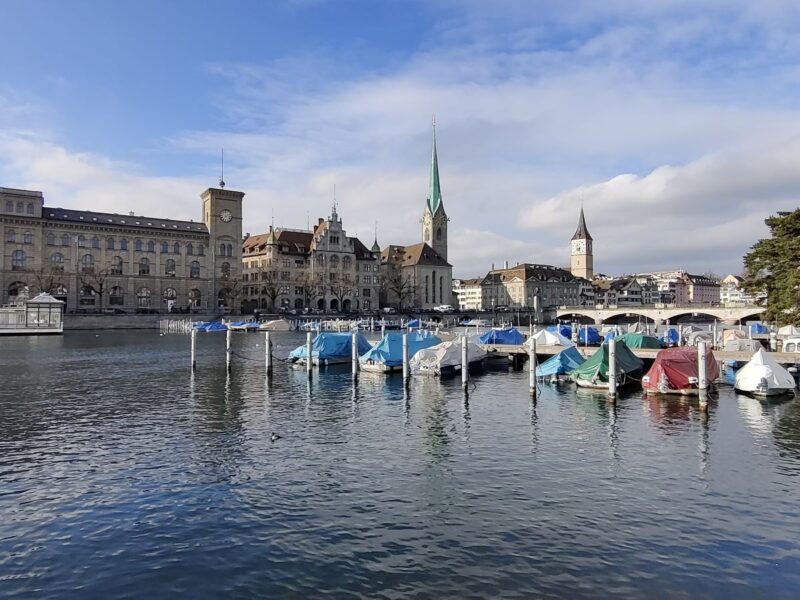
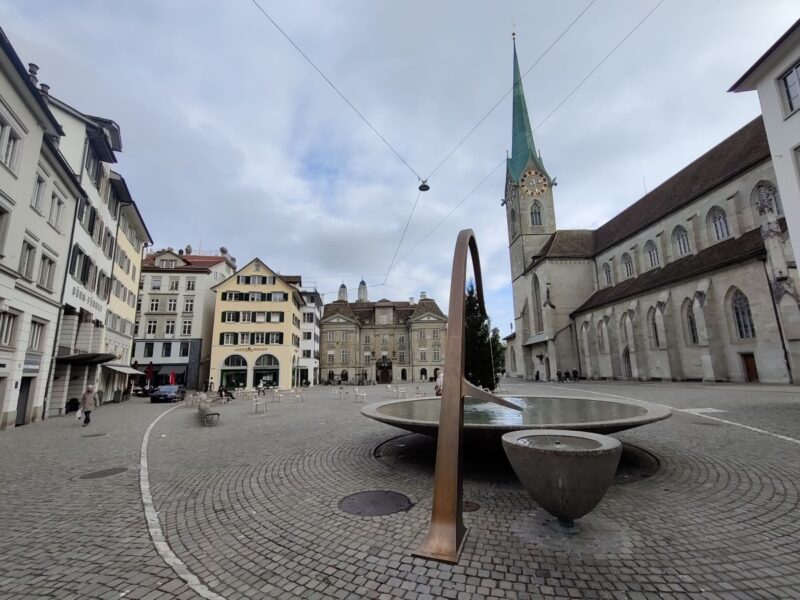
How to get around Zurich
Zurich is an incredibly well-connected city and a joy to get around on foot and by public transport. Although the city isn’t as sizeable as some major European cities, you’ll likely have to use public transport at least once while visiting Zurich. If you’re planning to visit lots of the top Zurich attractions and move around a lot, it can be wise to purchase a Zurich card which includes unlimited use of public transport for 24 or 72 hours, with prices starting at CHF 27 ($30). Standard public transport tickets cover the bus, tram and train networks in the city, which is divided into 7 zones. Zone 110 covers the entire city centre. A 1-hour ticket for use within zone 110 will cost CHF 4.30 ($4.75) and a 24-hour ticket for zone 110 will cost CHF 8.60 ($9.50). Here are the best options for getting around Zurich:
Tram – There are 15 tram routes in Zurich, which cover the majority of the city and provide the most useful form of public transport around Zurich. Trams operate daily from 05:00 to 00:30, with a late-night service from 01:00 to 05:00 on Friday and Saturday nights. Ticket prices are as mentioned above, and tickets can be bought at any tram stop. Single and day pass tickets bought at the tram stop do not need to be validated before use but longer passes do, you can validate your ticket at the ticket machine at any stop before you start your journey
Bus – Working alongside the trams in Zurich, buses cover the full city and are useful for getting to areas that the trams do not cover. Prices are the same as mentioned above and the hours of operation are the same as mentioned for the tram above
Train – Alongside Zurich HB, the main train station, there are many smaller train stations across the city that can get you around the city. Refer to the above for ticket prices in Zurich. For day trips to destinations outside of Zurich, most trains will leave from Zurich HB, you can book these in advance and save money through Trainline Europe.
Taxi – The excellent public transport system in Zurich means there is little need for a taxi, however, there are many available should you need to take one. Taxis are expensive so be prepared to pay considerably more. The basic rate for a taxi is CHF 6 ($6.50) and every kilometre driven is charged at CHF 3.80 ($4.25)
Boat – While boats on Lake Zurich do operate year-round, the winter schedule (November to March) is reduced from the summer schedule (April to October). Boats offer a more scenic option and can be a great way to see Lake Zurich. Prices for boats start from CHF 8.80 ($9.50). There are also boat cruises that cover different areas of the lake, which can be a great way to spend an hour or so in Zurich
Things to do in Zurich
With a combination of a well kept Old Town, a thriving and modern city centre, Lake Zurich and a variety of cultural offerings, Zurich has a great selection of things to do for any traveller. Here are our top picks of things to do in Zurich:
Zurich Old Town – Spanning either side of the Limmat River, exploring Zurich’s Old Town is one of the best things to do in Zurich. Many of the streets and top landmarks are well-preserved and offer a great insight into the history of Zurich. Some of the top landmarks in Zurich Old Town are Grossmunster, Fraumunster and Lindenhof viewpoint
Lake Zurich – Walking around Lake Zurich, or getting a boat across the lake is a must-do in Zurich. Some of the highlights of Lake Zurich include the many parks that surround it, swimming areas that open in the summer, and the Springbrunnen Aquaretum, a large fountain on the lake
Lindt Home of Chocolate – Lindt’s chocolate museum and experience is a celebration of Swiss chocolate and is a great way to spend an hour or two. Standard tickets cost CHF 15 ($16.50)
Swiss National Museum – Representing Switzerland’s history and culture from its beginning to the present day, the Swiss National Museum is a great way to learn more about Switzerland in Zurich. Standard tickets cost CHF 10 ($11)
Bahnhofstrasse – The most major street in Zurich city centre, Bahnhofstrasse is the main shopping street and connects many of the streets in the city centre. With some beautiful buildings and a plethora of shops, taking a stroll down Bahnhofstrasse is one of the top things to do in Zurich
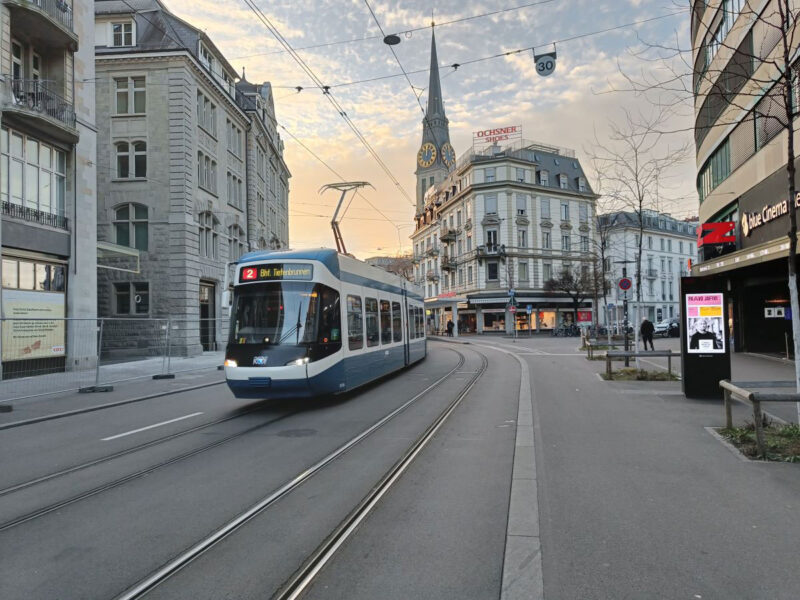
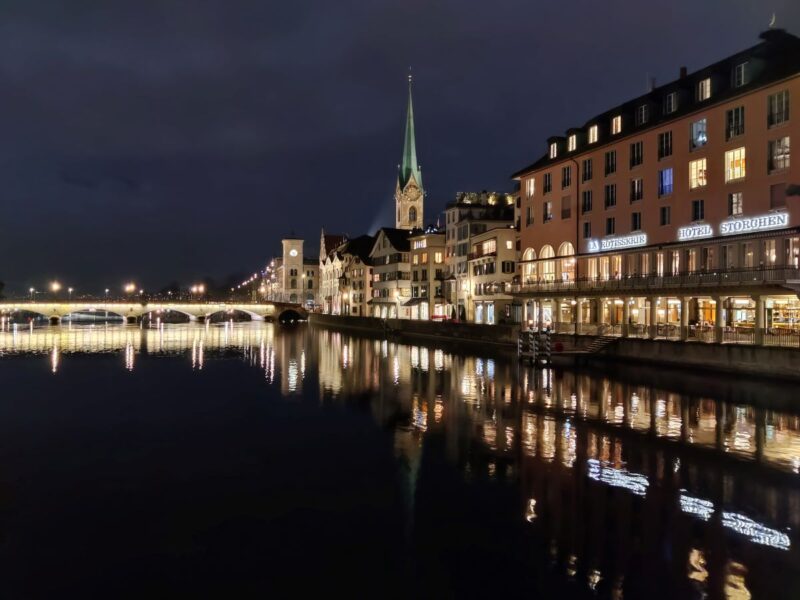
What to eat in Zurich
Swiss food has strong influences from Germany and France and, depending on where you are in Switzerland, you’ll find more of one than the other. Zurich’s close proximity to Germany means that traditional Swiss food in Zurich is more heavily influenced by Germany and Austria. Dishes are generally hearty with lots of meat and potatoes. Zurich is a major city with tons of options for eating out. There is also a strong multicultural influence in the city, and food from virtually any country can be found across the city. With just under 1700 restaurants in Zurich, there is something for everyone, albeit at higher prices than most European countries. Here are our top picks of what to eat in Zurich, Switzerland while you’re visiting:
Rosti – This is Switzerland’s national dish, consisting of coarsely grated potato which is fried into a large circular patty. Rosti’s are a common side dish or are delicious topped with various other ingredients
Zurcher Gerchnetzeltes – With origins in Zurich, this dish is on most Swiss menus across the city. It’s similar to a stroganoff but made with sliced veal strips
Alplermagronen – A comforting dish, this is similar to macaroni cheese but uses Swiss cheese and has cubed potatoes in it too. It is usually served or topped with apple sauce
Zopf – A plaited Swiss bread made with white flour, milk, eggs, butter and yeast. It is delicious and has a beautiful buttery taste
Swiss Sausage – Similar to German sausages, Swiss sausage can be made with pork, beef, veal or mixed. Commonly served with a bread roll and mustard
Money - Zurich Travel Costs
The currency in Switzerland is the Swiss Franc (CHF or Fr). Credit & Debit cards are widely accepted throughout Switzerland, including in Zurich, and there are plenty of ATMs that accept foreign cards. A service charge is rarely added to the bill in Zurich and is not expected, but a tip of 5-20% is commonly given. Switzerland is an expensive country, in fact, it is one of the most expensive countries in the world and Zurich is one of the most expensive cities to live in. This becomes very clear for most visitors within a few days. While we were able to save money on most aspects of our trip, we found the most expensive thing to be food. Here’s a guide for what you can expect to pay (per person) for:
A local draught beer – CHF 6 – CHF 9 ($6.50-$10)
A coffee – CHF 4 – CHF 6.50 ($4.50-$7)
A bratwurst (Swiss sausage with bread roll and mustard) – CHF 5 – CHF 9 ($5.50-$10)
Budget restaurant meal – CHF 18 – CHF 30 ($19.50-$32.50)
Mid-range restaurant meal – CHF 35 – CHF 60 ($38-$65)
High-end restaurant meal – CHF 70+ ($76+)
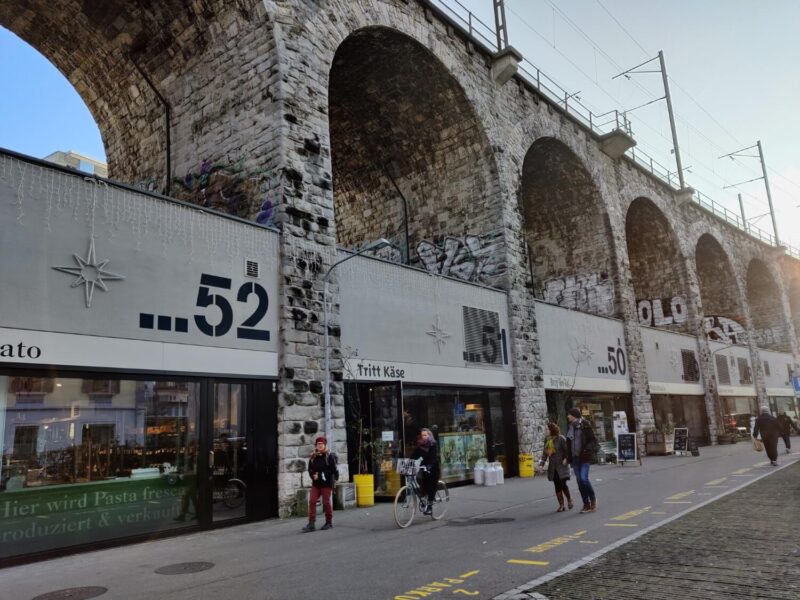
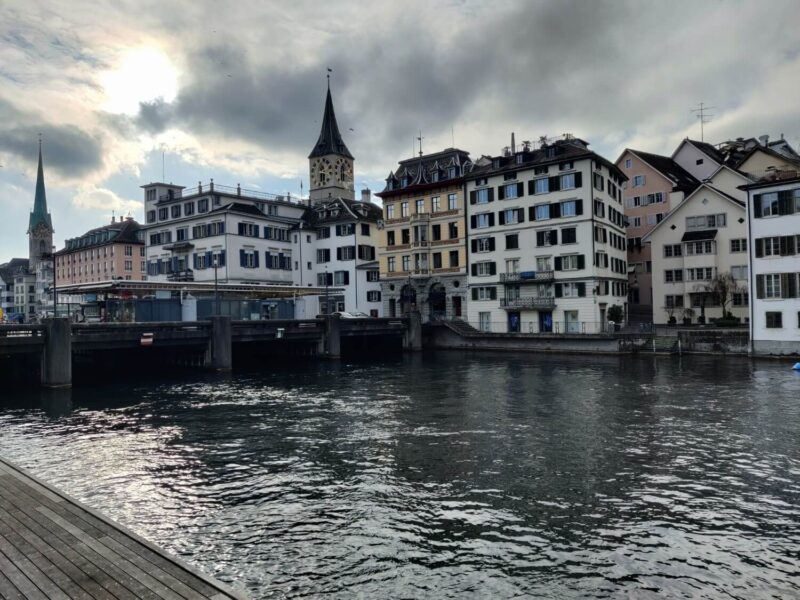
When to go to Zurich and for how long
Switzerland has a lot to offer different types of visitors. Those wanting to ski and enjoy winter sports will want to visit between December and February, however for the best conditions for sightseeing visit Switzerland between April and October. The peak summer season in Switzerland is from June to August, this is also when the weather is warmest, making for great conditions to explore the country. However, accommodation in Zurich is the most expensive during this time to try to visit in April or May for reasonable and better prices. However, ultimately Switzerland is a year-round destination, the only thing to note is that from November to March some outdoor attractions will be closed due to poor weather. We would recommend visiting Zurich for at least 3 days if possible, to explore the city properly, however, most of the sights can be seen in 2 days at a push. If you’re planning to do day trips outside of the city then a stay of 5 days should be ample.
Local language and phrases
Switzerland uses a mix of languages, which vary in how heavily each is used depending on what part of the country you are in. The most common languages across the country are German, French and Italian. In Zurich, German or Swiss-German is most commonly used, although English is widely spoken, particularly in areas where there are lots of tourists. Some useful German and Swiss-German phrases are:
Hello – Hallo or Grüezi
Bye – Uf Widerluege or Ciao
Thanks – Danke
Please – Bitte
Yes – Ja
No – Nein
Where is the WC? – Wo isch d’Toilette
Zurich travel tips
– Zurich is a very safe city and is safe for lone travellers, including lone females
– There are a range of places to eat including those specialising in vegetarian, vegan and gluten-free diets
– There are fountains all over Zurich city which are safe to drink from, so bring a bottle!
– Covid-19 PCR and Antigen testing centres are available across Zurich as well as in Zurich Airport
Zurich travel guide written in February 2022
This site uses affiliate links. When you click on a link and purchase an item, we may be compensated on qualifying purchases. However, this is at no extra cost to you. See our affiliate disclosure for further information.
Zurich Travel Articles
Zurich Walking Tour Videos And Maps
Check out our Youtube Channel for more Zurich walking tours, and tours for other destinations too.
Zurich Old Town Walking Route
A walking tour video highlighting the sights of Zurich Old Town with an accompanying map showing our walking route
Lake Zurich Walking Route
A walking tour video highlighting the sights and sounds of Lake Zurich with an accompanying map showing our walking route
Zurich Industrial Quarter Walking Route
A walking tour video highlighting the sights and sounds of Zurich’s industrial quarter with an accompanying map showing our walking route
Pin this Zurich Travel Guide to save it for later!
